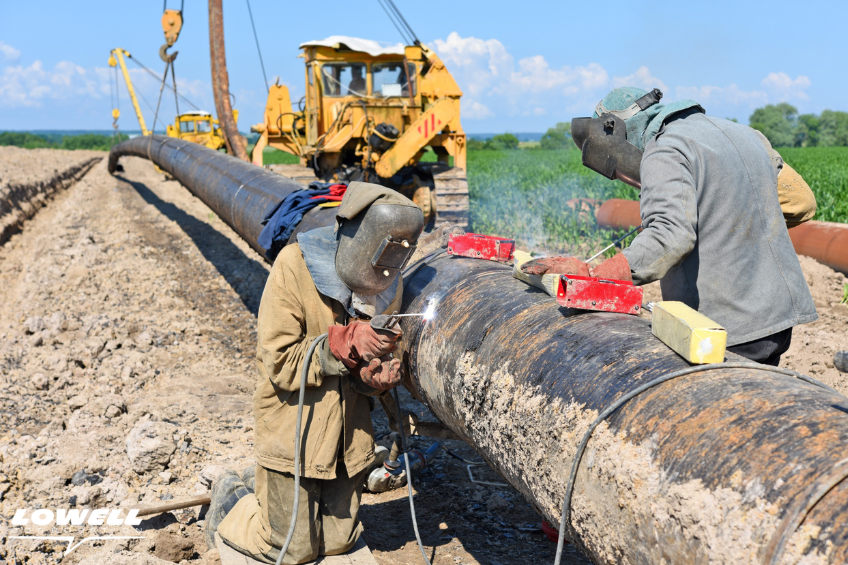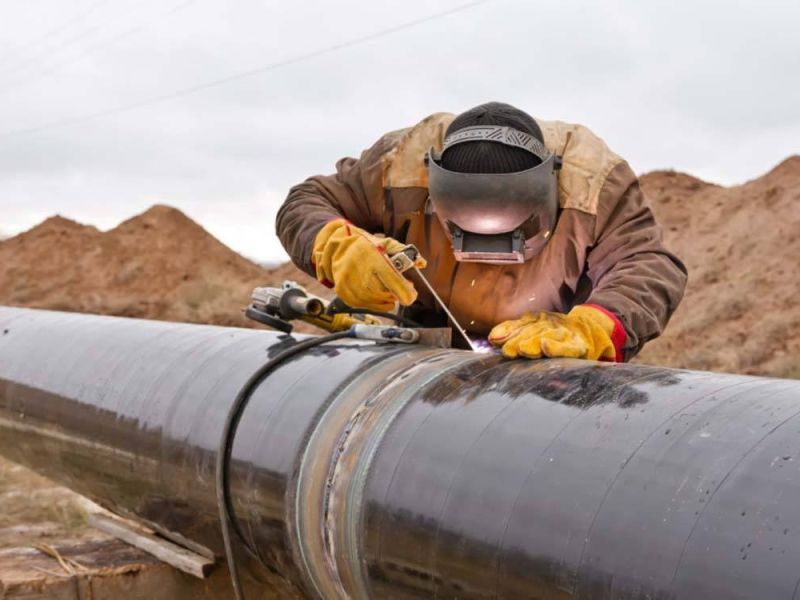A Comprehensive Overview to Comprehending Pipes and Their Role in Building and construction
Pipes are essential components in construction, serving crucial functions in waste, gas, and water monitoring. Their choice and application can significantly influence a structure's effectiveness and safety. Various products, such as PVC, copper, and PEX, use distinct advantages suited to specific needs (Creek Pipe Pipeline Construction). Comprehending these aspects is crucial for any kind of building and construction project. As one checks out the ins and outs of pipelines, the effects for compliance and public health and wellness come to be progressively noticeable
The Value of Pipeline in Construction
Pipes work as crucial channels in building, facilitating the motion of water, gas, and waste throughout buildings and framework. Their role expands beyond mere transport; they are crucial for guaranteeing the functionality and safety of household and commercial settings. Correctly mounted pipes add to the reliable circulation of resources, making it possible for daily tasks such as cooking, showering, and home heating. Pipelines play a crucial role in waste monitoring, ensuring that sewage and wastewater are successfully gotten rid of from living spaces.The relevance of pipelines is likewise reflected in their impact on public health and wellness. Malfunctioning or poor piping systems can result in contamination and harmful problems, making high quality materials and installation techniques necessary. In addition, pipes need to adhere to various building ordinance and regulations, which are developed to shield both owners and the setting. As a result, the significance of pipelines in construction encompasses both practical capability and essential wellness factors to consider.
Types of Piping Utilized in Building Tasks
Numerous kinds of pipes play a substantial duty in structure projects, each developed to fulfill particular demands and applications. Amongst one of the most commonly utilized pipe types are PVC, which is immune and light-weight to rust, making it excellent for drainage and vent systems. CPVC pipes, similar to PVC, can stand up to higher temperatures, usually made use of in hot water systems. Copper pipelines are recognized for their resilience and dependability, often used in pipes and home heating applications. Galvanized steel pipes, while much less typical today, were as soon as a criterion for water lines due to their toughness. Additionally, PEX (cross-linked polyethylene) pipes are acquiring popularity for household plumbing because of their adaptability and resistance to scaling and chlorine. Cast iron pipelines are preferred for their sound-dampening buildings, typically made use of in waste and dirt systems. Each pipe type serves unique features, ensuring effective operation in building jobs.
Common Materials for Water Lines and Their Feature
In building, the choice of pipeline products is essential for guaranteeing durability and functionality. Metal pipelines supply strength and resistance to high stress, while plastic pipelines supply lightweight and corrosion-resistant choices. Compound pipes combine the benefits of both materials, making them flexible choices for numerous applications.
Metal Pipe Options
Metal pipes are integral elements in building and construction, supplying a variety of alternatives that accommodate ecological conditions and different applications. One of the most usual products consist of steel, copper, and cast iron. Steel pipes are known for their toughness and durability, making them suitable for high-pressure applications. Copper pipelines are favored for their corrosion resistance and antimicrobial residential or commercial properties, frequently utilized in plumbing systems. Cast iron pipelines supply outstanding audio insulation and are perfect for waste and drainage systems. Each steel type has distinct benefits; as an example, galvanized steel can stand up to rust, while stainless steel offers premium rust resistance. Selecting the appropriate metal pipeline depends upon aspects such as expense, environmental exposure, and the particular demands of the construction task.

Plastic Pipe Advantages
Plastic pipes have gained popularity in building because of their lightweight nature and flexibility. These pipes, made from materials such as PVC, CPVC, and PE, offer superb resistance to rust and chemical damages, making them ideal for various applications. Their ease of installation further improves their appeal, as they can be reduced and signed up with without special tools. Furthermore, plastic pipelines are usually a lot more economical compared to metal options, contributing to lower overall project expenses. Their smooth interior surfaces reduce friction and enhance circulation rates, while insulation residential or commercial properties aid keep temperature control in pipes systems - Creek Pipe Pipeline Construction. With a large array of setups and dimensions readily available, plastic pipes successfully fulfill the diverse requirements of contemporary construction projects
Compound Pipeline Characteristics
Compound pipes incorporate numerous materials to leverage their specific staminas, leading to improved efficiency and longevity. Typically, these pipes are composed of layers that may include plastics, steels, and porcelains, each contributing distinct buildings. The inner layer might be made of a corrosion-resistant product, while the external layer gives toughness and effect resistance. This mix enables composite pipelines to endure severe temperatures and pressures, making them suitable for a broad range of applications, consisting of water supply and commercial procedures. Furthermore, composite pipes are often lighter than conventional materials, helping with simpler handling and setup. Their versatility and flexibility to various environments make them a preferred option in contemporary building projects, making sure durability and effectiveness in liquid transport systems.
Applications of Pipeline in Pipes Solutions

Electric Channels: The Duty of Water Lines in Wiring
In modern-day building, electric conduits play a vital function in making sure the reliable and secure routing of electric wiring throughout structures. These pipelines provide a safety pathway for electrical cords, safeguarding them from physical damages and environmental aspects. Various products, such as PVC, metal, and versatile channels, are made use of depending upon the certain demands of the installation.Furthermore, avenues assist in arranging electrical wiring systems, reducing the danger of electric risks like short circuits or fires. They also facilitate easier maintenance and upgrades, as wires can be accessed and replaced without significant interruption to the structure.Proper setup of electric channels is vital for conformity with structure codes and security guidelines. This organized approach not only boosts the longevity of the electric system yet additionally adds to the total safety and security and functionality of the building, making electric channels essential in contemporary construction helpful resources techniques.
Selecting the Right Pipe for Your Project
Just how can one guarantee the right pipe option for a building project? The selection process starts with recognizing the details requirements of the job, including the type of liquids being moved, pressure rankings, and ecological problems. Product choices, such as PVC, steel, and copper, should be reviewed based on sturdiness, corrosion resistance, and thermal properties.Next, one have to think about the pipe's size and circulation capacity published here to establish efficient operation. Governing standards and codes should also be abided by, as they dictate the appropriate products and practices for specific applications. Consulting with professionals and utilizing comprehensive resources can better assist in making notified decisions.Finally, assessing the cost-effectiveness of various choices is crucial, stabilizing preliminary expenses with long-term maintenance and replacement expenses - Creek Pipe Midland. By meticulously analyzing these elements, one can with confidence choose the most suitable pipe for their construction task, ensuring both capability and conformity

Maintenance and Examination of Water Lines in Construction
Correct selection of pipes establishes the foundation for their long-term efficiency, making maintenance and assessment critical elements in building. Routine maintenance warranties that any prospective issues, such as leaks, deterioration, or clogs, are recognized and resolved quickly, minimizing pricey repair work and project hold-ups. Arranged inspections, including aesthetic assessments and pressure examinations, play an essential function in reviewing the stability of pipeline systems.Additionally, monitoring environmental elements, such as temperature changes and dirt problems, can aid anticipate wear and tear. Utilizing innovative innovations, such as CCTV for indoor evaluations, can enhance the effectiveness of maintenance initiatives. It is crucial to document examination searchings for and maintenance tasks to establish a comprehensive background of the pipe systems. By prioritizing maintenance and examination, construction experts can prolong the life-span of their piping systems, ensuring they operate efficiently and accurately throughout the project's period.
Regularly Asked Questions
Just How Do Pipelines Affect Energy Performance in Buildings?
Pipes substantially influence energy effectiveness in structures by controling home heating and cooling systems. Appropriate insulation and products minimize energy loss, while effective plumbing styles minimize water use, ultimately resulting in reduced power consumption and functional expenses.
What Rules Govern Pipeline Installation in Construction?
Regulations controling pipe installation in construction usually consist of regional and national building codes, pipes codes, and security requirements. These assurance compliance with architectural honesty, product specifications, and health needs, advertising safety and security and efficiency in building methods.
Can Water Lines Be Recycled After Usage?
The inquiry of pipe recyclability is significant. Numerous materials, such as metal and specific plastics, can be recycled successfully. Nevertheless, the problem and kind of pipeline influence recycling feasibility, requiring correct analysis before disposal.
How Do Weather Effect Pipeline Performance?
Weather greatly influence pipe efficiency. Extreme temperatures can cause growth or contraction, while moisture may lead to deterioration. Furthermore, heavy rainfall can raise soil stress, affecting security and total capability of the piping system.
What Are the Indicators of Pipeline Failing to Look For?
Signs of pipeline failing consist of leaks, unusual sounds, discoloration of water, lowered water pressure, and noticeable corrosion. Regular examinations can help spot these problems early, stopping expensive repairs and ensuring system capability in the long-term. Pipes play a critical duty in waste monitoring, ensuring that sewer and wastewater link are successfully eliminated from living spaces.The significance of pipelines is likewise shown in their influence on public wellness. In building and construction, the choice of pipe materials is crucial for making certain toughness and functionality. Metal pipelines offer stamina and resistance to high stress, while plastic pipes offer light-weight and corrosion-resistant options. Furthermore, pipes are made use of to get rid of wastewater, attaching commodes, sinks, and drains pipes to community sewage systems or septic tanks.Different types of pipelines, such as PVC, copper, and PEX, are selected based on elements like durability, expense, and particular application demands. How can one guarantee the best pipeline option for a building and construction job?